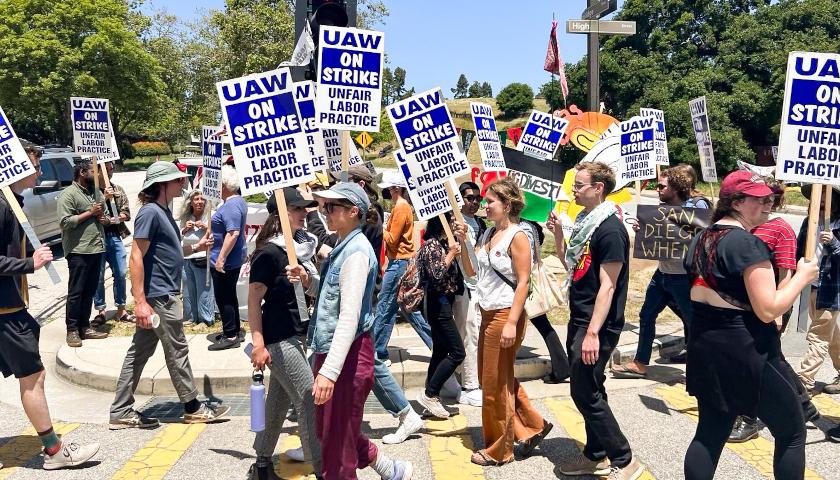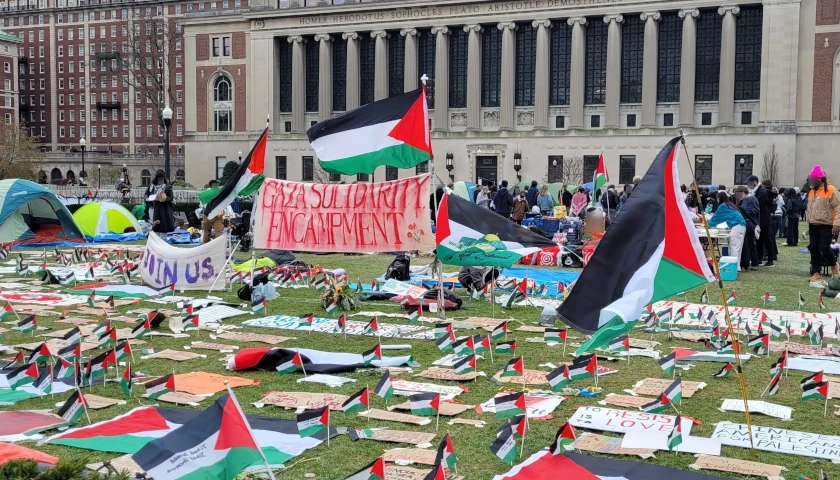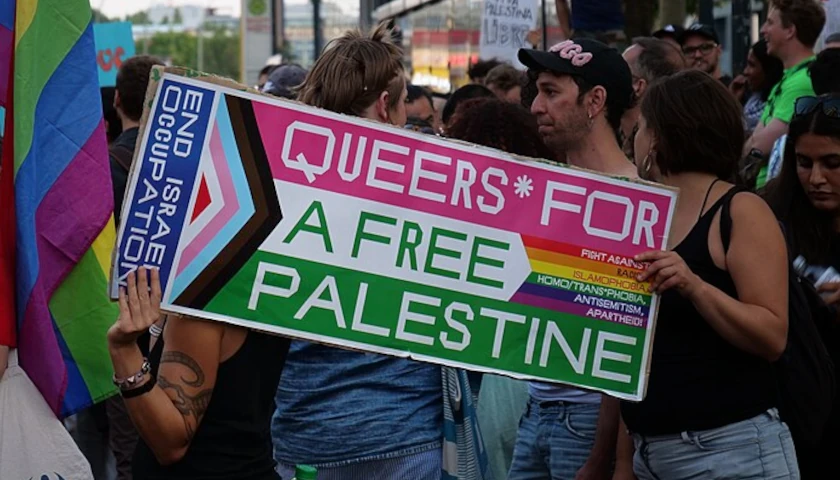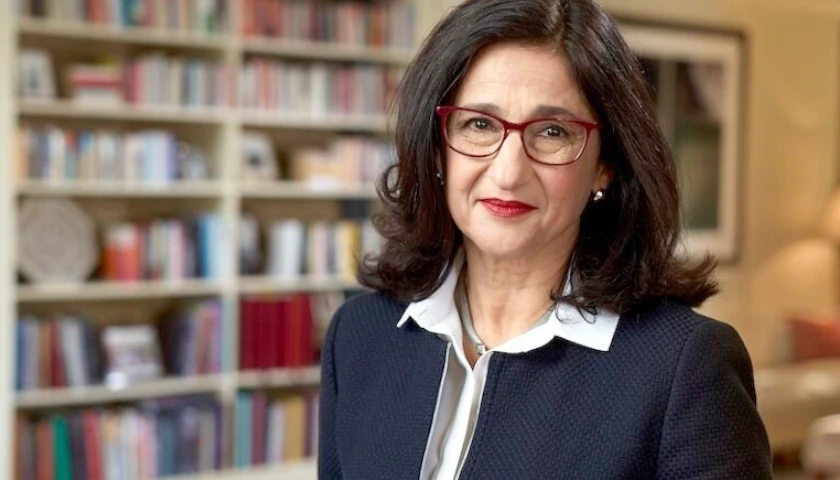by Madeleine Hubbard
The past spring semester for universities across the United States was marked with “Gaza Solidarity Encampments” and pro-Palestinian and pro-Hamas protests largely at commencements – that is, if commencement wasn’t canceled completely due to demonstrators – but now, the protests appear to have reached a new phase, potentially foreshadowing what is to come for America this summer.
Popping up on city property
A pro-Palestinian encampment popped up in Clark Park in West Philadelphia this week, according to local outlet 6ABC, marking the first encampment on city property.
On the other side of the country, hundreds of University of California, Santa Cruz employees walked off their jobs this week after the United Auto Workers Local 4811, a UC system-wide union that represents 42,000 graduate student teaching assistants and other employees, voted to strike over alleged free speech violations related to how the system leaders cracked down on pro-Palestinian protests on campus, according to the Los Angeles Times.
The union authorized a strike with 2,000 employees at UC Santa Cruz through June 30, Inside Higher Ed reported, and union officials followed through Thursday with their warning to order strikes on other campuses if university officials did not capitulate to their demands.
The union board on Thursday announced on X, that it called on workers at the UCLA and UC Davis to strike starting on Tuesday, May 28. That same day, pro-Palestinian activists erected barricades and built another encampment at UCLA, while the school’s chancellor testified before Congress about antisemitism on campus, according to ABC 7.
The strike comes with a few weeks left before finals and commencement, which is in mid-June at all three schools.
Demanding amnesty for protestors
The union is accusing the school of being responsible for a “series of unfair labor practices,” notably by allegedly not notifying university employees about an updated disciplinary proceeding process before announcing it publicly. The policy forces employees and students who have been arrested or cited for violating university policy to undergo a review process with the school. The union also voiced outrage with the school’s decision to not give amnesty to protesters who broke school rules or the law as part of Gaza Solidarity Encampments.
“UAW’s strike is unlawful because the goal is to pressure the University to concede to a list of politically motivated demands closely linked to the protests occurring across California and the nation,” UC administrators said. “While the University continues to support free speech, lawful protests, and its community’s right to engage in the same, UAW is a labor union and its negotiations with the University must be tied to terms and conditions of employment and terms in the collective bargaining agreement.”
Meanwhile, protesters with the group “De Actions 4 Palestine” planned a three-day protest in front of Biden’s Wilmington, Delaware, home this weekend.
City University of New York Professor Angus Johnston, who researches student activism, told PBS this week that because the Israeli-Palestinian conflict has been going on for decades, he does not expect demonstrations to end any time soon.
“The underlying crisis is one that did not start on Oct. 7. And until that’s resolved, I don’t see that the students are going to have reason to go back to their dorms,” Johnston said.
Former Israeli Ambassador to the United States Michael Oren told the “John Solomon Reports” podcast earlier this month that he saw a parallel between the current protests and the anti-war protests of 1968, noting how both started at Columbia University and spread to other campuses. He expects the protests to reach a climax at the Democratic National Convention in Chicago this August, just as the demonstrations did in 1968.
“One comparison is interesting,” Oren said. “In 1968, the image that the Democratic Party was incapable of containing the chaos on the street, was instrumental in procuring the victory for Richard Nixon. And by focusing on this chaos, I think the media is doing a great disservice to the Biden administration.”
A protest is being organized by the Coalition to March on the DNC, which includes more than 50 activist groups such as Black Lives Matter Chicago, the U.S. Palestinian Community Network and Arab American Action Network. The coalition said it will march in Chicago during the DNC whether it is granted a permit or not, according to CBS News.
Meanwhile, the Protest.one, an online New York-area protest calendar, has events scheduled every single day for the rest of the summer, with a majority of the activism events focused on promoting a ceasefire.
Protests on college campuses are continuing outside of the United States.
An encampment began at McGill University in Canada last month, and administrators said that they have made multiple offers to demonstrators that were accepted at other universities in an attempt to end the encampment to no avail.
McGill President Deep Saini said Wednesday that administrators had told protesters that they would examine divesting from Israel, build relationships with and increase assistance to Palestinian scholars, and provide more transparency in investments.
“Participants in encampments elsewhere have seen such offers as important steps and have reached agreements with university administrations. Yet at McGill, the occupants continue to eschew meaningful conversation,” Saini said.
Meanwhile, 16 people were arrested at Oxford University in the U.K. on Thursday after they occupied a building on campus, according to the BBC.
The demonstrations may backfire, however.
The Washington Post published an analysis by political reporter Aaron Blake on Wednesday, titled “Pro-Palestinian college protests have not won hearts and minds.”
“Multiple polls in recent weeks have shown relatively little sympathy for the protesters or approval of their actions. And notably, large numbers of Americans have attached the ‘antisemitic’ label to them,” Blake wrote.
UC Davis School of Law Professor Alan Brownstein wrote an opinion column for The Hill on Thursday titled, “Not every protest is good, and American history proves it.”
“The use of the tool itself warrants neither special praise nor respect. What matters is why and how protests are organized and conducted. Characterizing conduct as a protest tells us little or nothing about whether it is worthy of our support or needs to be rejected and constrained,” he wrote.
– – –
Madeleine Hubbard joined Just the News as a fast file reporter after working as an editor at Breitbart News. She previously served as the special assistant to the Assistant Secretary of Public Affairs at the U.S. Department of Health and Human Services during the first year of the COVID-19 pandemic.
Photo “UAW 4811 Strike” by UAW 4811.





